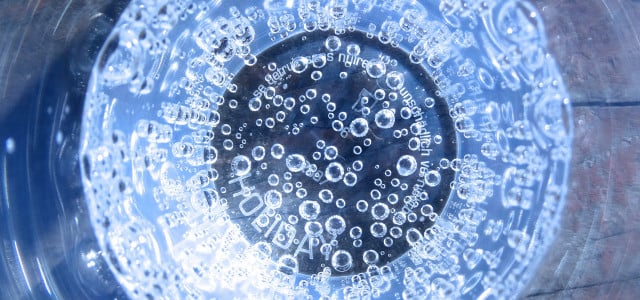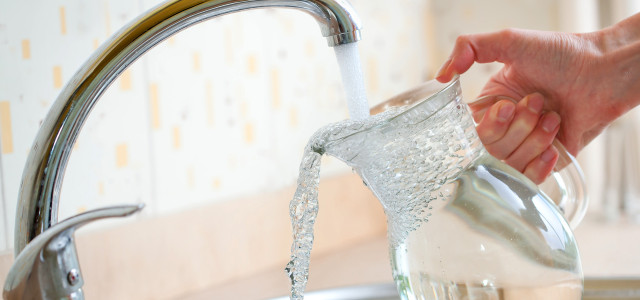
Drinking enough is important – but which is better: still water or sparkling water? A common assumption: carbonated water is unhealthy because it attacks the teeth, acidifies the body and makes you fat. What is it about the myths surrounding sparkling water?
Whether in an apple spritzer or pure, carbonated water is popular in Germany. Sparkling water goes by many names: sparkling water, soda water, seltzer water or bitzel water. No matter what the carbonated water is called, the process of making it is always the same:
The fizz is created when carbon dioxide (CO2) combines with water (H2O). Carbonic acid (H2CO3) can form naturally in areas where volcanoes used to be active. For most bottled water from the supermarket, CO2 is pressed into bottles under pressure.
Sparkling or still – which is healthier?
The term carbonic acid is correct – but it sounds more dangerous than it is: carbonic acid is only found in traces in sparkling water. Carbonated water is made by adding carbon dioxide (also known as carbon dioxide) to water. Carbonic acid is produced for a very short time, but it disintegrates very quickly (within nanoseconds). The excess CO2 escapes gradually in the form of small bubbles. What fizzes when you open the bottle and what we commonly call carbonic acid is actually carbon dioxide. And that has no harmful effects on the body, experts agree.
Nevertheless, there are a number of persistent myths surrounding sparkling water. Here are the facts:
Is carbonated water bad for your teeth?
Myth 1: The acid in mineral water is said to attack tooth enamel and make it more susceptible to tooth decay.
Short answer: Whether carbonated water attacks tooth enamel is extremely controversial. In reality, this has not been shown so far and dentists are giving the all-clear.
Background: German and American dentists consider carbonic acid to be harmless, but a study from the “Korean Journal for Orthodontics” comes to the conclusion that mineral water can very well be a risk for etched or sealed tooth enamel. The bubble can therefore affect the micro-hardness of the tooth enamel surface and loosen material from seals or fillings. We wanted to make sure whether carbonic acid is unhealthy and asked dentists:
- Dentists give the all-clear: “Carbon dioxide is not harmful to the teeth, this is ‘only’ CO2”explains Roland Frankenberger, President of the German Society for Dental, Oral and Maxillofacial Medicine (DGZMK).
- “Carbonated mineral water is little or not at all erosive – the same also applies to beer,” according to the German Dental Association (BZÄK). You can find a good overview of the erosive potential of various drinks, foods and medicines here. This also shows that only mineral water with the addition of lemon attacks the enamel.
- And Bianca Göpner-Fleige, dentist from the patient consultation of the Berlin Dental Association (KZV), says very clearly: “Carbonated water is completely harmless for our teeth”.
However, she warns: “Drinks containing citric or phosphoric acid (cola drinks) can damage tooth enamel. If the drinks also contain additional sugar, the risk increases even further”. Even those who often drink orange juice or lemon water for breakfast should be careful and wait at least half an hour before brushing their teeth after eating. Otherwise, the acid can roughen the tooth enamel so that the toothbrush could sand it down.
Does carbonated water make you fat?
Myth 2: Those who drink sparkling water gain weight more easily.
Short answer: Whether with or without sparkling water: water contains no calories.
Background: Only a study in the journal “Obesity Research & Clinical Practice” from 2017 actually points to the connection between carbonic acid and weight gain. However, this is often and gladly quoted. According to this, carbonic acid expands the stomach, putting pressure on the cells that are responsible for the production of the hormone ghrelin. Ghrelin is a hormone that stimulates the appetite. However, the scientists only used 16 rats and 20 students for their study. The results are not meaningful enough and further research must be carried out.
In any case, the fact is: water contains no calories and even contributes to a feeling of satiety if you drink sparkling water directly before eating.
Is sparkling water bad for your stomach?
Myth 3: If we drink soda and have to belch, stomach acid can also come with it. This can lead to heartburn.
Short answer: If you have a sensitive stomach or suffer from reflux, you should not drink too much sparkling water. For everyone else there is no danger.
Background: Anyone who drinks sparkling water absorbs a gas (CO2) – and that has to come out again. Part of it goes through the digestive tract into the blood and is then exhaled through the lungs. The rest escapes through belching and flatulence. As a rule, this is not a problem – sparkling water is therefore no less unhealthy than tap water or still water.
For people who suffer from heartburn, however, mineral water can have an unpleasant side effect: when you belch, stomach acid can get into the esophagus and cause heartburn.
The consumer advice center advises: “If you have a sensitive stomach, it is better to avoid carbonic acid and rather use water with a lot of hydrogen carbonate. Hydrogen carbonate, also known as bicarbonate, neutralizes excess acids that are produced during normal metabolism.” According to the Mineral and Table Water Ordinance (MTVO), mineral water with a hydrogen carbonate content of 600 milligrams per liter can be described as containing hydrogen carbonate.

The German Society for Nutrition (DGE) explains that carbonic acid stimulates digestion in a mild way: “Anyone who tends to constipation can try whether carbonated water stimulates the intestines.”
Unhealthy carbon dioxide? Does sparkling water lead to acidosis?
Myth 4: Due to the low pH value, carbonated water leads to over-acidification of the body.
Short answer: Carbonic acid decomposes quickly into carbon dioxide and water – and does not make you acidic.
Background: A special feature of carbonated water: it has a lower pH value than still water. While tap water and still water have a neutral pH of around 7, sparkling water has a pH of around 5.3. Carbonated water is therefore slightly acidic – this is one of the reasons why it is considered unhealthy in naturopathy.
However, carbonated drinks do not make the body acidic in the long term. The reason: the carbonic acid is unstable and breaks down extremely quickly into its components CO2 and water. “When you open the mineral water bottle, the carbonic acid escapes with a hiss (in the form of CO2). The remaining part breaks down in the stomach, which means that you have to belch or gets into the blood via the digestive tract and is exhaled unnoticed through the lungs,” explains Silke Restemeyer, nutritionist at the German Society for Nutrition (DGE). This means that carbonated water does not contribute to over-acidification of the body.
It doesn’t matter whether it’s still or sparkling water, tap water is better than bottled water
Carbonated water does not make you fat and is by no means unhealthy. For people with sensitive stomachs, it can cause unpleasant but not dangerous symptoms. But it doesn’t matter whether it’s sparkling water or still water – one thing is important above all: Pay attention to the packaging.
In contrast to plastic bottles, glass bottles are not automatically the better choice. Because they are so heavy, transporting them is more energy-intensive. When it comes to bottled water, regional water in reusable glass bottles has the best climate balance. Even more environmentally friendly, however, is tap water – which you can drink without hesitation in Germany.
Techzle.com therefore advises: If you like drinking carbonated water, it makes more sense not to buy water crates all the time, but to bubble up ordinary tap water.
Read more on Techzle.com:
- The best drinking bottles for on the go
- Drink water: this much is healthy
- 10 Amazing Things That Can Be Made Without Plastic
Editorial assistance: Nadja Ayoub
German version available: Is Carbonated Water Bad for You?